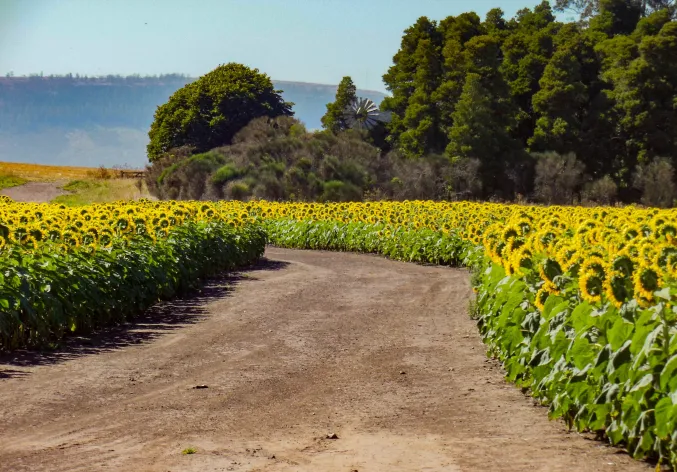Syngenta commits $2 billion and sets new targets for innovation to tackle climate change
- Syngenta dedicates $2 billion over five years to innovation specifically targeted at delivering a step change in agricultural sustainability
-
CEO Erik Fyrwald will explain new goal to drive two technological breakthroughs to market each year at Sustainability Summit in New York
- Syngenta to reduce carbon intensity of its operations by 50%, supporting the ambition of the Paris Agreement on climate change
Basel/Switzerland, 22 October 2019 - Syngenta today announced $2 billion will be spent over the next five years to help farmers prepare for and tackle the increasing threats posed by climate change.
The investment supports a new Syngenta sustainability goal of delivering at least two technological breakthroughs to market each year, to reduce agriculture’s contribution to climate change, harness its mitigation capacity, and help the food system stay within planetary boundaries.
Erik Fyrwald, Chief Executive Officer at Syngenta also announced that the investment in research and development for sustainable agriculture will be matched by a drive to reduce the carbon intensity of the company’s operations by at least 50% by 2030 to support the ambitious goals of the Paris Agreement on climate change. Syngenta’s commitment has been validated and endorsed by the Science Based Targets initiative (SBTi).
“Agriculture is now at the front line of global efforts to tackle climate change,” said Mr Fyrwald. “Syngenta is committed to accelerating our innovation to find better and ever safer solutions to address the shared challenge of climate change and biodiversity loss.”
“These aren’t just words, this is real action that will drive focus in Syngenta to help farmers tackle climate change and reduce the sector’s contribution to the world’s greenhouse gas emissions.”
The $2 billion will be directed towards programs with clearly differentiated benefits or breakthrough technologies that will enable a step change in agricultural sustainability, such as land use, soil health and integrated pest management.
Through a multi-year collaboration with The Nature Conservancy, Syngenta is developing strategies to identify and test new innovations and technology that can benefit farmers and contribute to positive environmental outcomes. The collaboration is grounded in efforts to promote soil health, resource efficiency and habitat protection in major agricultural regions worldwide.
Sally Jewell, CEO at The Nature Conservancy said: “Achieving conservation at scale will require bold action from the private sector. As businesses increasingly recognize the risks of climate change and the benefits of sustainability, we welcome the opportunity to contribute our science and expertise to help transform business practices. Syngenta’s investment in innovation is an important step toward a future where people and nature thrive.”
Cynthia Cummis, Director of Private Sector Climate Mitigation at World Resources Institute, one of the Science Based Targets initiative partners said: "We congratulate Syngenta for having their emissions reduction targets validated by the Science Based Targets initiative. Leadership from the agribusiness sector is vital in the fight against climate change, and by setting these targets, Syngenta is putting themselves on a pathway to future-proof growth.”
The targets form part of Syngenta’s Accelerating Innovation commitment launched earlier this year to address the increased challenges faced by farmers because of climate change, soil erosion and biodiversity loss. Progress against these targets will be reported annually and independently audited. The announcement was in large part informed by the completion of 150 listening sessions around the globe to help the company’s leaders identify priority areas for investment.
About Syngenta
Syngenta is one of the world’s leading agriculture companies. Our ambition is to help safely feed the world while taking care of the planet. We aim to improve the sustainability, quality and safety of agriculture with world class science and innovative crop solutions. Our technologies enable millions of farmers around the world to make better use of limited agricultural resources. With 28,000 people in more than 90 countries we are working to transform how crops are grown. Through partnerships, collaboration and The Good Growth Plan we are committed to improving farm productivity, rescuing land from degradation, enhancing biodiversity and revitalizing rural communities. To learn more visit www.syngenta.com and www.goodgrowthplan.com. Follow us on Twitter at www.twitter.com/Syngenta and www.twitter.com/SyngentaUS.
Contact Information
| Media Relations Manager Victoria Morgan +41 61 323 23 23 media.relations@syngenta.com |
Head of Corporate Communications U.S. Paul Minehart +1 202 737 89 13 |
Cautionary Statement Regarding Forward-Looking Statements
This document contains forward-looking statements, which can be identified by terminology such as ‘expect’, ‘would’, ‘will’, ‘potential’, ‘plans’, ‘prospects’, ‘estimated’, ‘aiming’, ‘on track’ and similar expressions. Such statements may be subject to risks and uncertainties that could cause the actual results to differ materially from these statements. For Syngenta, such risks and uncertainties include risks relating to legal proceedings, regulatory approvals, new product development, increasing competition, customer credit risk, general economic and market conditions, compliance and remediation, intellectual property rights, implementation of organizational changes, impairment of intangible assets, consumer perceptions of genetically modified crops and organisms or crop protection chemicals, climatic variations, fluctuations in exchange rates and/or commodity prices, single source supply arrangements, political uncertainty, natural disasters, and breaches of data security or other disruptions of information technology. Syngenta assumes no obligation to update forward-looking statements to reflect actual results, changed assumptions or other factors.


